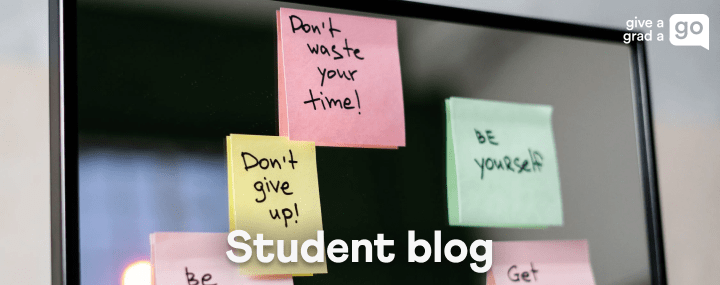It’s a classic catch-22: You need a job to get experience – but you need experience to get a job.
In the competitive graduate jobs market, setting yourself apart from other applicants can be tough – especially if you have little or no work experience to shout about.
But having now worked in recruitment for 4 years, I know first-hand that there are plenty of ways to impress potential employers and get a job without experience.
By being open-minded about your job prospects, perfecting your CV, and doing the necessary preparation for your job interview, it’s possible to get a graduate job without experience.
How to get a job without experience 🎓
-
If you want to stand out from other candidates, you need to be applying for the right roles.
Before you start applying for graduate jobs, think about what you’re good at, and the kinds of roles that your skills and qualifications will enable you to do.
If you’re unsure, speak to friends or family members to get their opinion on what graduate jobs they could see you doing.
It’s also a good idea to seek advice from a Recruitment Consultant – they are experts who work with graduates every day, and will be able to help you pinpoint which roles and sectors you’d be best matched to.
They’ll also help you with applying for a job without experience – offering you guidance and advice on what employers are looking for and how you can impress them in other ways.
It’s great to have an idea of the kinds of graduate jobs you should be applying for – but don’t be afraid to be flexible about your job applications.
By considering other suggestions, you might find something that’s a perfect match for your skills and qualifications – which will help you to stand out from other applicants.
Finally, be realistic about the roles you’re applying for. If a job spec says that the job requires 1-2 years of experience, you’re unlikely to be considered with no work experience at all.
No experience careers do exist – you just have to be realistic about the roles you apply for (generally targeting entry-level roles that don’t ask for a lot of previous experience).
By applying for little to no experience graduate jobs, you’ll be able to make yourself stand out from the crowd by focusing on other things you can offer.
As a general rule, jobs for people with no experience will be made clear on the job description – look out for words like ‘Graduate’, ‘Junior’ or ‘Assistant’ in the title.
-
Your CV is likely to be the first thing an employer looks at, so it should portray the very best version of you and your skill set.
Because you don’t have any work experience, you’ll need to focus on other qualities in order to make your CV stand out.
- Tailor your CV – Your CV should be tailored to each role and company you apply for.
Include the most relevant experiences, skills, and interests – showing the employer that you understand what the role requires and the kind of candidate they are seeking.
When you read a job spec, identify the key attributes that the employer is looking for.
If you can demonstrate that you have used these skills in the past, you can make your CV attractive even without any relevant work experience. Here’s some tips on how to tailor your CV to each graduate job. - Summarise your skills – Including a summary of 3 to 4 sentences at the beginning at your CV will help you to capture the attention of the employer and pitch yourself as the best candidate for the job.
Pick the unique combination of skills that you are going to speak about throughout your CV, and include these in your summary, to ensure that you remain consistent, and to emphasise the skills you can offer from the outset. - Highlight your qualifications – If you’re lacking in work experience, your qualifications are going to be a huge focus for the employer.
Make sure that the layout of your CV effectively demonstrates each of your qualifications, and mention the grades you achieved in certain modules if they are particularly impressive.
You can even go into a little more detail about a grade you achieved,
i.e: 3rd-year History research project, “The American Civil War ” (75%)
Working with 4 other students over the course of a semester, I demonstrated project management, teamwork, presentation and research skills. - Focus on skills, not roles – In order to show an employer that you can offer value to their business, you need to demonstrate that you have transferrable skills despite having no work experience.
The best way to show these skills is through extra-curricular activities, hobbies and interests, volunteering or any part-time jobs you’ve had – just make sure to mention the specific skills you’ve learnt through each one. - Add value – If you are still at university or you have some extra time on your hands, add value to your CV by volunteering or doing an online course.
Even if it’s just for a few weeks, having an extra experience or achievement to add to your CV is never a bad thing!
Check out these free courses for upskilling
- Tailor your CV – Your CV should be tailored to each role and company you apply for.
-
If you are successful in getting an interview, you’ll need to be able to sell yourself to the employer.
As you don’t have work experience to discuss, be prepared to talk in-depth about your qualifications, university experience, interests, and the skills you’ve learnt along the way.
It’s essential to make sure you’re fully prepared beforehand (we’ve got a whole guide offering interview advice).
Preparing and practicing your answers will not only help you to come across as a calm and confident candidate, but will also ensure that you don’t leave out the things you want to talk to the employer about – like your qualifications or achievements.
Finally, use your job interview to make yourself memorable!
Having a great CV is one thing, but if you can impress the employer with your cool, calm and collected attitude, and show them your unique personality in your interview, you’ll be remembered for all the right reasons.
Getting a job without experience can be tough – but by staying open-minded and flexible in your search, optimising your CV, and doing the necessary preparation for your job interview, you can ensure that your application stands out to employers.
Want to know how to get a graduate job? Find more career advice on our career advice blog – or check out the latest graduate positions!







